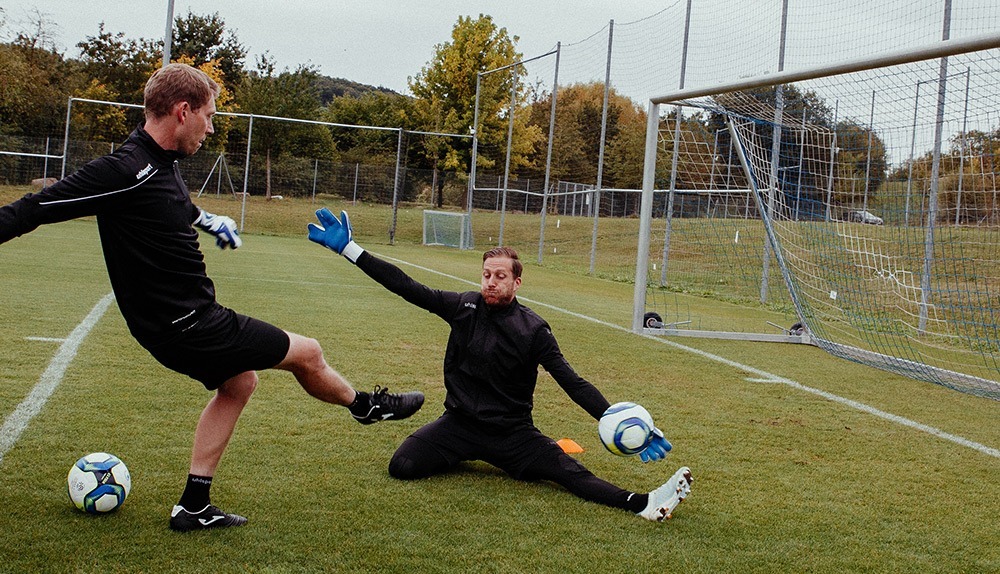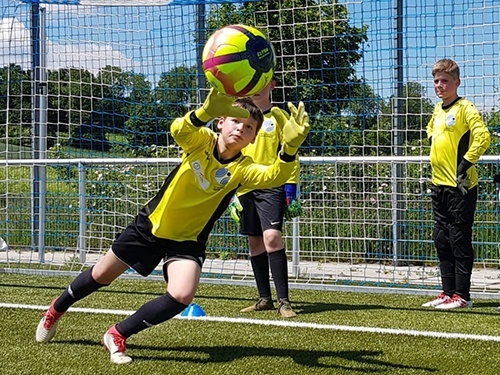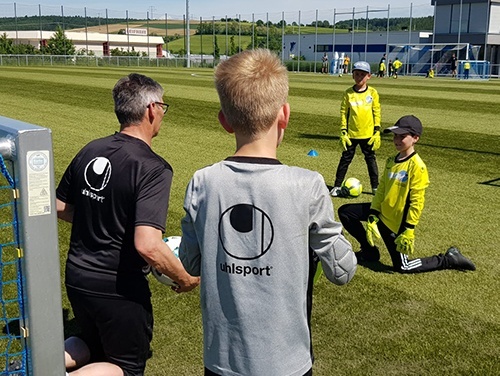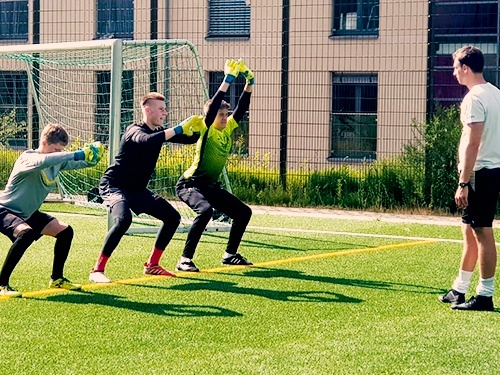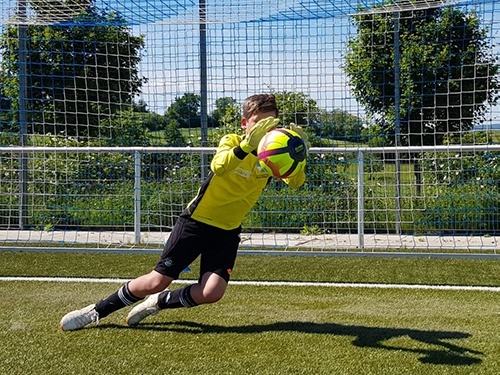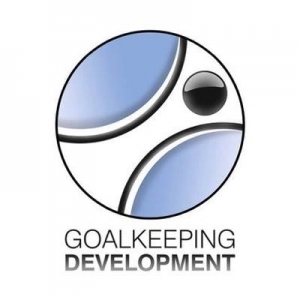Training optimisation for goalkeepers
20 November 2019
Michael Rechner is goalkeeper trainer of TSG 1899 Hoffenheim and founder of Goalkeeping Development, a wide-ranging training program for modern goalkeepers. In the second part of our interview he describes how Oli Baumann reacts to new training methods, what role data plays in modern goalkeeper training and how Goalkeeping Development promotes young goalkeepers.
The choice of gloves is essential for a keeper’s performance. Since when do you trust uhlsport and how did you get into it?
I myself have been working with uhlsport for a long time. Also in my active time as goalkeeper I ended up at uhlsport because of the excellent quality.
The original contact came through Andreas Geser, whom I have known for many years and with whom I now work very closely and trustingly. Still today it is a cool feeling for me to wear a new pair of gloves, to perceive the smell of the adhesive foam, to pick up the ball and then feel the grip. It’s probably hard for an outsider to understand, but as a goalkeeper or goalkeeper coach, I think everyone knows what I’m talking about.
How does Oli Baumann react when you start training with a new training method?
Oli is generally very open when it comes to new forms of training, exercises or methods. It is this openness to think outside the box and to think about everything for yourself that is his great strength and probably one of the reasons why he is so successful. Oli Baumann has been playing in the Bundesliga for over ten years, is uninterruptedly number 1 and has played over 300 Bundesliga games at this level! Learning and developing are extremely important skills which Oli Baumann brings with him.
“In the field of performance measurement in training, we work with data such as metres run, speeds on the course or actions to the right or to the left – falling, jumping, diving.”
In the professional training you also use various performance data in goalkeeper training. Which goalkeeper-specific data can be measured and which of them can be effectively integrated into training to improve performance?
Regarding the performance measurement there are different areas, like the training, the game, or the performance diagnostics. First and foremost I work with the Goalkeeping Development Software, i.e. all data for training and game documentation is stored and statistically evaluated, such as training times, training contents, games, goals conceded and game evaluations.
In the field of performance measurement in training, we work together with Catapult as an external provider. Here data such as meters run, speeds on the course or actions to the right or to the left – falling, jumping, diving – are collected. In addition, the individual actions are differentiated according to different speeds, such as high, medium and low intensity, so that it can be determined how fast a goalkeeper moves, how fast he dives and how fast he gets up again. Also with regard to the sportive load control, this is helpful data that is collected in every training session.
“There’s definitely an exchange among the goalkeeper coaches. I am in regular and intensive contact with many other colleagues from the Bundesliga.”
In addition, the German Football League (DFL) collects standardised data from each match in the Bundesliga. For this purpose, the DFL, together with various partners, creates evaluations, such as statistics on saved shots, passing rates or the number of crosses intercepted. All these are interesting parameters that we include in our analyses.
Goalkeeper training looks different in every club, consists of more or less innovative elements. Is there a network within the goalkeeper trainer community in which people exchange information regularly?
Yes, there is definitely an exchange among goalkeeper coaches. Just recently, there was a goalkeeper conference organised by the German Football Association (DFB) on the initiative of Marc Ziegler, the DFB goalkeeper coordinator. At this event, goalkeeper coaches were able to exchange ideas intensively over two days.
In addition, I maintain an intensive contact with some of my colleagues. With my former goalkeeper coach in Hoffenheim from the U23, Steffen Krebs, who is now a goalkeeper coach at Borussia Mönchengladbach, I am close friends. But also with many other colleagues from the Bundesliga, which I partly know already for many years, I am in regular and intensive exchange, as for example with Simon Henzler (FC Schalke 04), David Thiel (Bayer 04 Leverkusen) or Frederik Gößling (RB Leipzig), just to name a few examples.
With Goalkeeping Development you regularly organise training programmes for goalkeepers. What does your offer look like and how do you communicate the modern goalkeeper play to the newcomers?
In our Keeper Academy it is not mainly a matter of teaching the modern goalkeeper play, but first and foremost that the children have a lot of fun and joy in goalkeeping. First of all, we teach the basics, such as catching or falling techniques, and integrate the modern understanding of the game into our goalkeeper training.
The offers of our Keeper Academy are extremely varied. We offer regular weekly training, individual training tailored to the specific needs of the players, goalkeeper days during which several training units are completed in one day, and goalkeeper as well as elite camps lasting several days for special support. This means that we have a very wide range of activities for all ages and levels.
In addition, we have a large pool of coaches who work for us. We have chosen these trainers ourselves, because they have a very high qualification. Furthermore, we train our trainers ourselves several times a year in order to be able to continue offering a high standard regarding the qualification of the trainers.
In part one of the interview, Michael reveals where he gets the inspiration for his goalkeeper training, what Goalkeeping Development in general is all about and what influence the choice of glove can have on one’ s performance.

